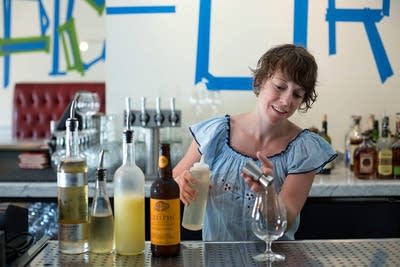Appetites: Expanding food and beverage pairing to cocktails
Go Deeper.
Create an account or log in to save stories.
Like this?
Thanks for liking this story! We have added it to a list of your favorite stories.

Wine has been served with food for as long as vintners have been fermenting grape juice, but pairing a specific wine with a particular dish is a more contemporary practice. Interest in matching wine with food has spawned similar pairing of beer and food and, most recently, the development of pairing cocktails and food.
Rachel Hutton, senior editor of Minnesota Monthly magazine, speaks with Tom Crann of MPR News' All Things Considered about an innovative Minneapolis restaurant that is rethinking the notion of a mixed drink.
• Photos: Cocktails at The Bachelor Farmer
TOM CRANN: It sounds as if there is far more to food and beverage than the old wine adage: white wine with fish, red with meat.
Turn Up Your Support
MPR News helps you turn down the noise and build shared understanding. Turn up your support for this public resource and keep trusted journalism accessible to all.
RACHEL HUTTON: That's certainly the most popular rule. I consider it a basic rule-of-thumb for the idea that you generally want to try to match light-bodied wines with lighter foods, and full-bodied wines with heavier, richer foods.

A crisp, dry Sauvignon Blanc will pair well with a delicate white fish. A Cabernet Sauvignon is a great match for a well-marbled steak because the tannins in red wine --which are compounds from the grape skins that create a dry, astringent sensation -- cut through the fat.
CRANN: But rules are meant to be broken, right?
HUTTON:Sure, especially because some whites, such as oaky California Chardonnays can be fuller bodied than certain light reds, such as Pinot Noir. In rethinking these old adages, restaurateurs have been doing all sorts of creative things such as pairing oysters with stout beer, and, most recently, at the Bachelor Farmer in Minneapolis, creating food-pairing cocktails.
CRANN: Is this an update on the three-martini lunch?
HUTTON:That classic trope from the Mad Men era doesn't actually offer an optimal food-beverage combination -- most cocktails are far too strong to pair well with food. In developing these new food-friendly, less-alcoholic mixed drinks, the Bachelor Farmer's head bartender, Pip Hanson, downplayed spirits with dilution or replaced them with lower-proof beverages such as sake and hard cider.
CRANN: How would you describe the drinks?

HUTTON:They're served in wine glasses, which I think helps get the diner in the right frame of mind for food-pairing, though the drinks are really not like wine at all. They have more flavor complexity, like a cocktail, and yet they're far lighter and subtler than, say, a cosmo or a Manhattan.
CRANN: So a full-strength cocktail would overwhelm the food?
HUTTON:Yes, you wouldn't be able to really taste the flavors in the dish, much less how the flavors in both food and beverage are interacting.
CRANN: And how do they interact?
HUTTON:The drinks have enough acidity and brightness to complement dishes without dominating them. I sipped Hanson's cider and sherry cocktail with one of the restaurant's Scandinavian toasts with yellow split peas and I thought its crisp sweetness was a nice counterbalance to the thick, mild puree.
CRANN: Sounds very unique.
HUTTON:As far as I know, it's the first food-pairing cocktail menu in the Twin Cities, and maybe even the country.
Dear reader,
Political debates with family or friends can get heated. But what if there was a way to handle them better?
You can learn how to have civil political conversations with our new e-book!
Download our free e-book, Talking Sense: Have Hard Political Conversations, Better, and learn how to talk without the tension.




